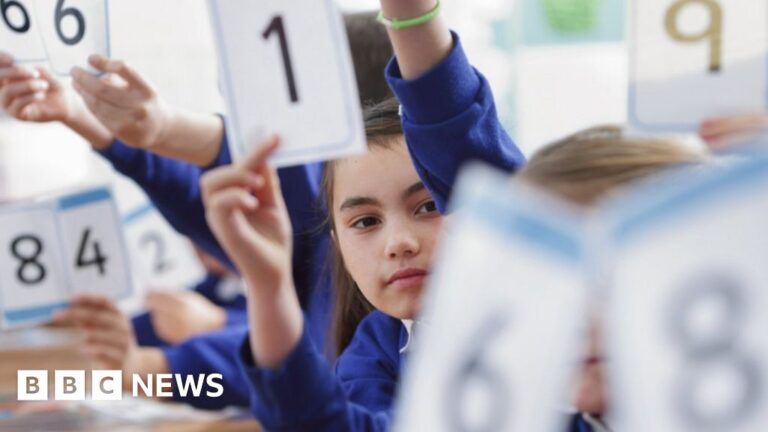- Written by Sam Francis & Chas Geiger
- BBC Liverpool Politics
Labor has launched plans to teach “real world” maths skills in primary schools.
The school wants children to start learning financial literacy, including budgeting, from the age of four.
Bridget Phillipson, the shadow education secretary, told a party conference in Liverpool that there was a “chronic cultural problem with maths”.
“If young people start hating maths at the age of 16, it’s too late,” she said on the final day of the conference in Liverpool.
Ms Phillipson said young people need mathematics for life and work, and expressed her determination to “bring mathematics to life for the next generation”.
“Whether it’s budgeting, cooking, exchange rates or pay stubs, math is key to success.
“Mathematics is the language of the universe and the basis of our collective understanding. Mathematics cannot be left until the last year of school.”
Mr Raver said poor math skills in childhood could lead to problems in adulthood, such as not being able to analyze basic graphs or calculating the value of supermarket items. ing.
In 2016, the OECD estimated that nine million working-age adults in the UK lack basic literacy and numeracy skills, costing the economy an estimated £25 billion a year.
Mr Phillipson said Labor would be “the party of high standards” for children from all backgrounds, as background “shouldn’t get in the way of opportunity”.
real world mathematics
Labor said it would instruct teachers to teach children how maths is used in the world around them as part of a pre-planned review of the school curriculum.
Students are taught math through concepts such as household accounts, exchange rates when going on vacation, sports standings, and cooking recipes.
The party said that instead of hiring specialist maths teachers, primary school staff would be retrained and supported by “maths champions”.
Latest figures show around 25% of pupils do not meet the expected level in mathematics by the time they leave primary school.
Latest statistics also show the number of maths teachers is up 9% since 2012, but shortages are being reported across the country.
Mr Phillipson also told the conference he was determined to implement “ambitious reforms to ensure every family and every child has access to early education in every corner of our country”.
Sir David Bell, former permanent secretary to the Department for Education and former chief inspector of schools, has announced that a new initial plan will be drawn up.
Labour’s plans were widely welcomed by many teachers’ unions.
Paul Whiteman, general secretary of the National Association of Headteachers, said: “We welcome the ambitions expressed by the shadow education secretary and her recognition of some of the serious issues facing schools.”
But he added: “It is vital that Labor works with experts to flesh out its proposals.”
Daniel Kebede, general secretary of the National Education Union, said: “Labour politicians recognize that there needs to be a restructure between the teaching profession and government, and they must work with teachers to ensure that central government “We recognize that this goal is unlikely to be achieved.”
In his conference speech, Mr Phillipson hit back at critics of Labor’s plans to strip private schools of some of their tax exemptions.
In response to a Guardian report in June suggesting that an Independent Schools Council (ISC) official had described her as “very chippy” in a private message, she said: It’s about making important changes.”
Last month, Labor backed away from a pledge to strip private schools of their charity status.
But the party remains committed to the UK’s policy of imposing a 20% value-added tax on tuition fees and ending the business rates relief that private schools benefit from.
An ISC spokesperson said: “We share Labour’s aim of wanting the best outcomes for all children and have consistently offered to work together to achieve this.”
